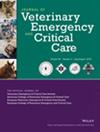Validation of a human paper-based blood typing method for use in pet pigs
Abstract
Background
Evidence-based medical practices for pet pigs are needed. EldonCard is a human blood-typing card shown to be rapid and reliable in identifying blood phenotypes of pet pigs. The objective of this study was to validate EldonCard by determining its reliability, reproducibility, and robustness for its routine use in the clinical setting.
Key Findings
Twenty-four venous blood samples from pet pigs were collected for a prospective in vitro study. Blood genotypes (“EAAA0” and “EAA00”) were identified in 15 samples via polymerase chain reaction (PCR). All samples were phenotyped (“A,” “Aweak,” and “0” or “–”) via EldonCard. Kappa (κ) statistics measured the level of agreement between 2 raters, and between EldonCard and PCR. McNemar's test determined if an association between the blood types and EldonCard or PCR exists, with significance at P < 0.05. Agreement between raters and methods was perfect (60/60 [100%], κ:1, P < 0.001; 15/15 [100%], κ:1, P < 0.001). There was no difference in the proportions of blood groups based on method.
Significance
In conjunction with previous data, EldonCard is a rapid, accurate, reliable, precise, and robust in-clinic blood-typing method for the A0 system of pet pigs. EldonCard is now a validated blood-typing tool for the A0 system of pet pigs and maybe used for pretransfusion screenings and identification of donors and recipients.

 求助内容:
求助内容: 应助结果提醒方式:
应助结果提醒方式:


